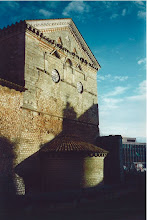Of Grass, Sheep, Moles, and Dirt

Currently it's in vogue to consider oneself, as a shepherd, to actually be in the business of being a 'grass farmer.' Of course, this assumes one actually understands the culture of various grass species and legumes, which I can say I don't. I am a novice. I can recognize winter rye and red and white clovers, and tall fescue. That's about it. So I'll stick to 'novice shepherd' for now as I feel my way along.
Right now my small flock cannot keep up with the grass on our current pasture rotation. So I spend time on the small tractor mowing. If I had a good farmer's mower, I'd put up some of the cutting for hay rather than mulch it with the mowing deck on the small tractor (it's a John Deere, but with front and back PTOs and can do a great deal - a lawn and garden tractor on steroids). If I had a good scythe and knew how to wield it, I'd take a swipe at cutting hay and gathering it into shocks after it dried.
Walking the North pasture last night, while rounding up the flock to put them in the fold for the night, I examined grass, which now nearly exceeds the height of the sheep, and generally am pleased with what was, over winter, a bit of a poorly pasture (the South pasture is much more lovely). The combination of overseeding with the gentle planting action of sheeps' hooves on moist soil seems to have encouraged some recovery.
Nevertheless, I continue to have moles working the soil in the North pasture far more abundantly than anywhere else on the property.
I have mixed feelings about moles - within limits they are actually good tillers of the soil and I will leave them be as they go about their business of aerating and mixing soil layers and providing better drainage, as well as eating large numbers of insects, insect larvae, and other pests. I sometimes take some of the freshly tilled soil to use for soil layers in the compost heaps and for mixing in the garden with compost and more sandy soil (our native soil on the farm is a silty clay loam of volcanic origin - fairly productive but I like to mix it for the raised beds in the garden). So the moles provide some benefit, so long as they don't get out of hand.
So far, one of our resident cats has ensured just that. Everyone earns his or her keep on
 the farm, whether sheep (grass management, wool, natural fertilizer, meat), chickens (eggs, some grass/weed control, bug control, some meat), dog (all around warning system/deterrent, hunting companion), cats (rodent management) . . . and of course, the farmer (caretaker, weed-puller, cultivator, ear scratcher, etc., etc.). Even the mole earns his keep - and for that I think some hills in the pasture are a fair trade. I like to think that moving the soil into other parts of the system (compost, garden) is a means to conserve the now-exposed soil and avoid any significant scatter/topsoil blowout as a result of wind-driven dust.
the farm, whether sheep (grass management, wool, natural fertilizer, meat), chickens (eggs, some grass/weed control, bug control, some meat), dog (all around warning system/deterrent, hunting companion), cats (rodent management) . . . and of course, the farmer (caretaker, weed-puller, cultivator, ear scratcher, etc., etc.). Even the mole earns his keep - and for that I think some hills in the pasture are a fair trade. I like to think that moving the soil into other parts of the system (compost, garden) is a means to conserve the now-exposed soil and avoid any significant scatter/topsoil blowout as a result of wind-driven dust.Today at lunch I got out the Farm Journal (sort of a log of doings so maybe I'll learn lessons from it), which I had failed to update in about three months, and started thinking of all that the last three months has brought. That got me to thinking of the inventory of all the things growing on the farm right now (besides weeds and grass and invasive but delicious blackberries). So here, dear reader, is an inventory of things striving:
In the Garden:
 Lettuce (3 kinds)
Lettuce (3 kinds)Spinach
Broccoli
Cauliflower
Onions (Walla Walla)
Rosemary
Cilantro
Garlic Chives
Mint
Pepper plants (one red, one yellow)
Tomato (3 varieties)
Pole Beans
Pumpkin
Summer Squash
Yellow Zucchini
Blueberries (six bushes)
Grape vines (two old vines - "eating grapes")
Strawberries (Everbearing)
In the "Orchard" (actually orchard and other locations)
 Apples (six+ varieties)
Apples (six+ varieties)Pears (5 varieties)
Cherries (two varieties I think - one is Bing)
Italian Plums
Figs (3 varieties)
Persimmons will come on just after Thanksgiving
Walnuts (5 English Walnuts - aged but still producing beautiful nuts for October)
Walnuts (5 English Walnuts - aged but still producing beautiful nuts for October)
In noting this inventory today I realized how God-blessed we are to have this place, for we reap what we did not sow and we will sow what others will later reap. It is a special stewardship to hold the land for the time we will be able to hold it, however long that is.
In that regard, I recommend to you read "Mad Farmer Liberation Front" and consider the import of these words of Mr. Berry:
Ask the questions that have no answers.
Invest in the millenium.
Plant sequoias.
Say that your main crop is the forest that you did not plant, that you will not live to harvest.
Say that the leaves are harvested when they have rotted into the mold.
Say that the leaves are harvested when they have rotted into the mold.
Call that profit.
Prophesy such returns.
May you have a blessed next few days awaiting Pentecost.


0 Comments:
Post a Comment
<< Home